In 2020 during the pandemic, Rodney introduced Samantha to Gilbert Gottfried's Amazing Colossal Podcast, which became a source of companionship and comfort. Gilbert often spoke of his appearance with Robert Osbourne on TCM and the films he chose to run. This month we honor Gilbert's and his co-host Frank Santopadre's birthday month by reviewing those titles.
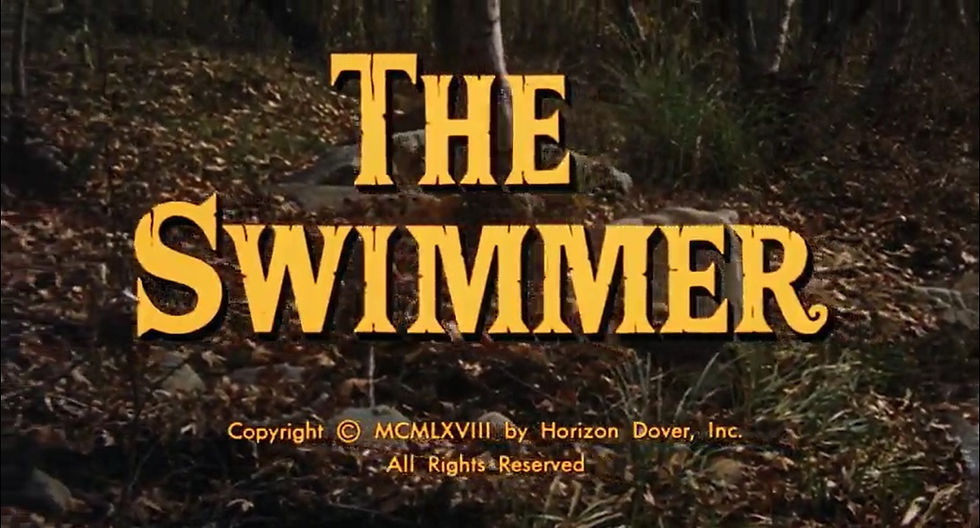
RODNEY BOWCOCK: This is one of those movies that seems very simple but as you consider it more there is a lot more going on than is initially apparent. The essential plot revolves around Ned Merrill (Burt Lancaster), a middle-aged man enjoying a midday pool party with some friends. Ned contemplates that there are enough pools at assorted homes of people that he knows that it would be possible for him to basically swim home. What follows is a series of related vignettes of Merrill’s experiences visiting his neighbors.
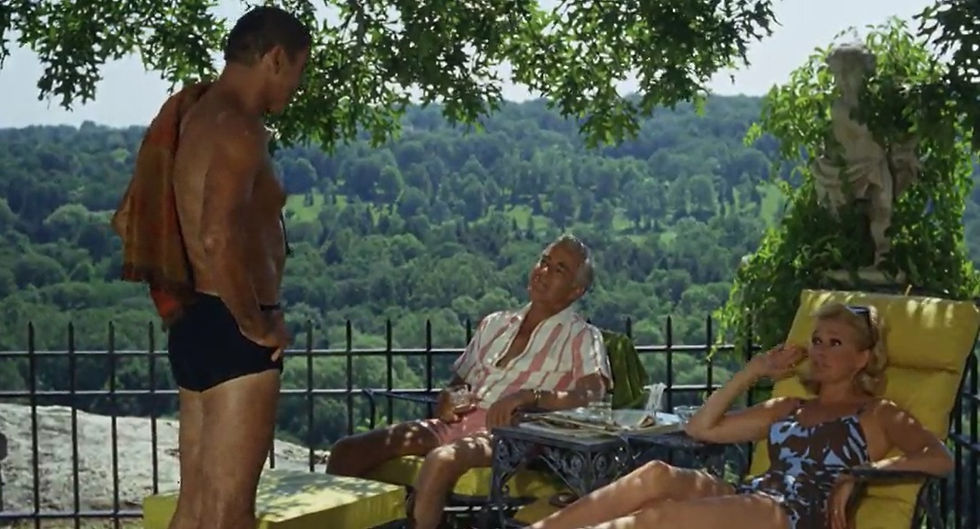
SAMANTHA GLASSER: The John Cheever story ran in the July 1964 issue of The New Yorker. In his intro with Robert Osborne, Gilbert said, "It's based on a John Cheevers story, and I never read the story; I'm just showing off by tell you who wrote it."
The storytelling is well done. At the beginning of the movie, life appears to be carefree. Old friends are reminiscing about the good old days around a pool on a beautiful sunny day. The lighting is bright and the location is colorful and inviting. But where Ned is interested in swimming in the pool the way they would have as virile kids, his peers are more interested in drinking and lounging outside of the water. As the film progresses, things become a lot more dismal, lonely and disturbing. The pools become less inviting, even going so far as being drained and dirty or overcrowded, as in the case of the public pool. At first he comes off as eccentric but likeable and accepted by his peers, but we gradually learn that things are not as they seem on the surface with Lancaster's character.

RB: There is a lot of symbolism as the film continues along and the pools become less and less desirable as we learn more about Ned’s life, although much of that is purposely left open to interpretation.
SG: I have many great memories of my own childhood pool, Swimland in Whitehall, Ohio, now the site of an apartment complex. We got a pass each summer and spent many happy days there swimming, pretending to be in an episode of Baywatch, practicing tricks off the diving boards, and eating treats from the Snack Shack. I stepped on a bee there, my first and only bee sting. We swam under the stars to the beats of WNCI DJs. I've always wondered if I ran into my future husband there without knowing it, because he also frequented the pool. I can still feel the unpleasant slimy concrete under my feet in the bathrooms which we tried to avoid at all costs if we could.
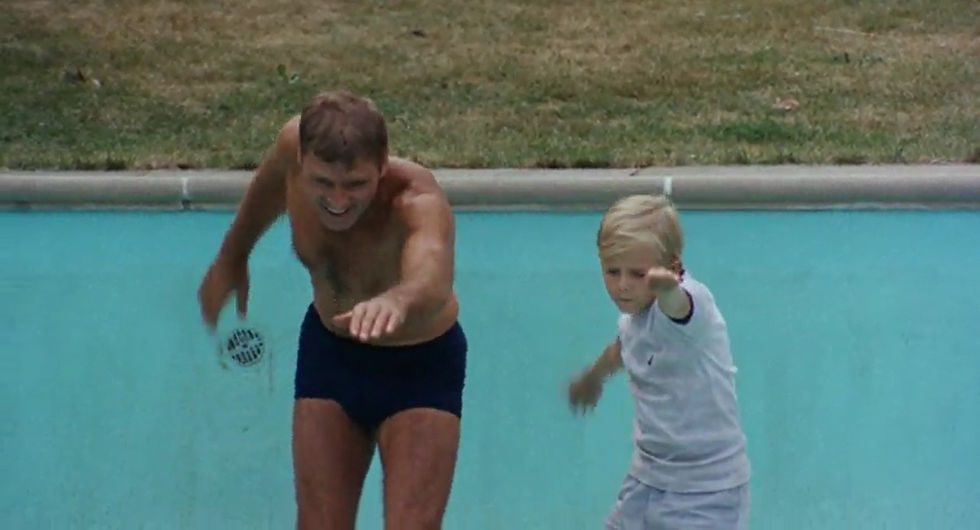
RB: While I have vague awareness of the sorts of places that you describe here, my experiences there were more limited. Living in a rural area, we would occasionally frequent a neighbor’s home that had a large pond with a diving board. Later or around the same time, my parents had a small above ground pool built in the backyard where my brother and I spent many, many summer days together for 5 or 6 years or in the backyard pool at my grandparents’ house. Lots of my peers have fond memories of a specific pool called Surf Cincinnati and my wife has memories very similar to the ones that you describe. Summers and water are essential parts of youth, still today. While fashions have changed, public pools like the one we see here are still prevalent.
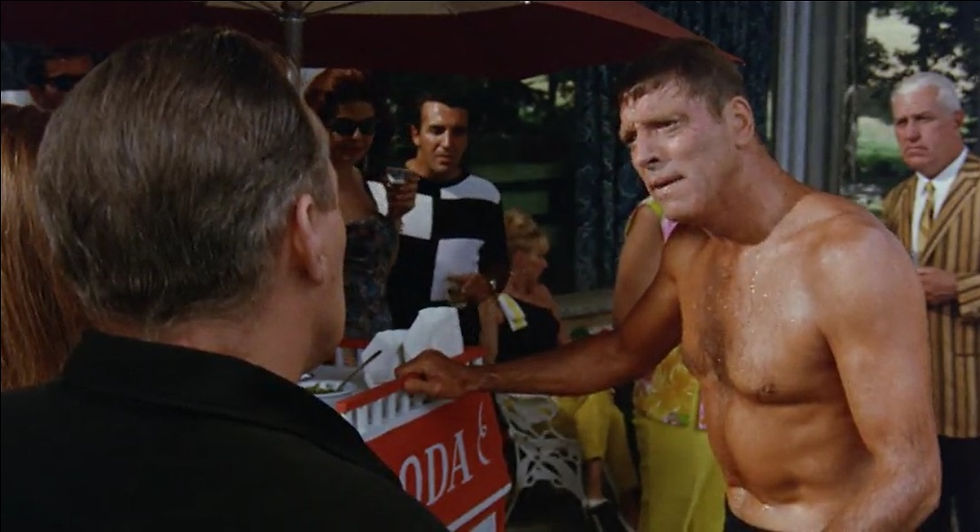
SG: Lancaster was afraid of the water, so he trained with UCLA water polo coach Robert Horn to learn to competently swim. The filming ran into conflicts between the writers, producer and star and in order to complete shooting, Lancaster used $10,000 of his own money to finish when Columbia wouldn't. The movie was shot in Connecticut.
RB: Westport Connecticut was the hometown of director, Frank Perry (his wife Eleanor adapted John Cheever’s New Yorker short story for the screen). After he was fired by producer Sam Spiegel, Sydney Pollack was brought in for some additional transitions and scenes that were shot in California. Much of the supporting cast was replaced during these reshoots.
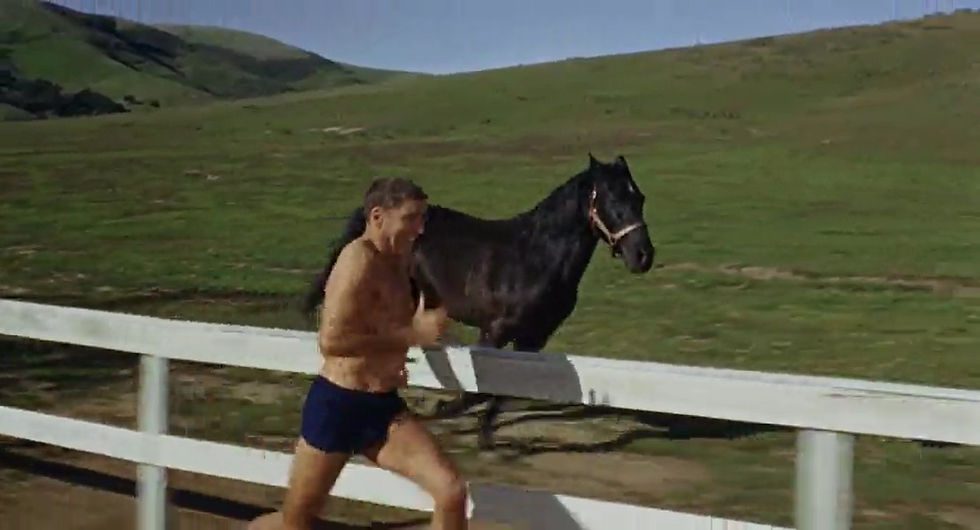
SG: I don't know that I ever would have watched this movie had it not been for Gilbert's recommendation. There were moments that were off-putting, like when Ned frolics in the woods with his former babysitter, now grown up and confessing her old crush on him. She views him as a father figure, but he sees her as an object of desire. Their disconnect is emphasized by the way the scenes are shot, often close-ups of one or the other listening to each other's words, but rarely in two-shot. Janet Landgard plays the babysitter and she is cute and earnest in the part. I felt mortified for the actress, though, who is by no means out of shape, but in the slow-motion running scenes, you can see the skin on her stomach jumping with her, and knowing how sensitive women are about their bodies, I imagined these scenes, which seem to go on for a long time, would be uncomfortable to watch. The extreme close-ups and double exposures of her face as he jumps are jarring. The other scene that threw me was at the nudists' home; I never anticipated or desired to see Burt Lancaster naked from the back.
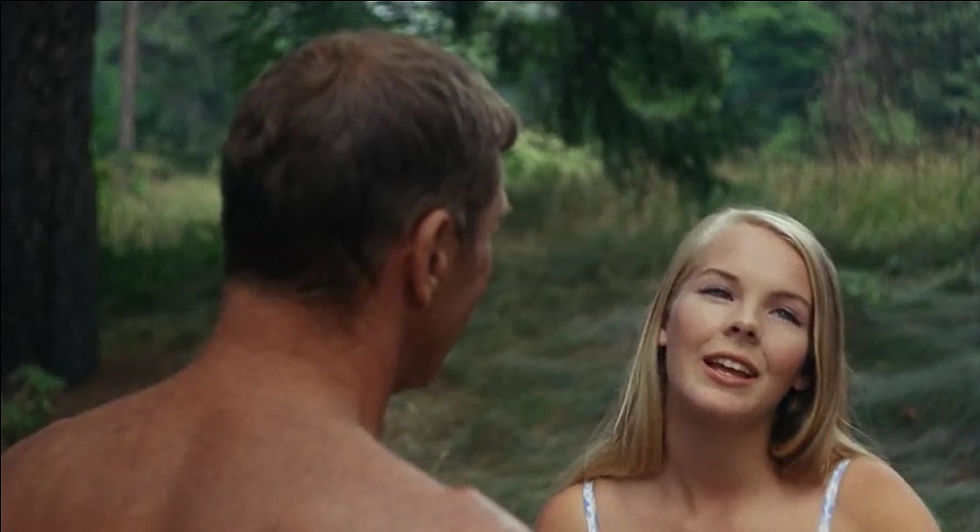
RB: Did you loudly proclaim “HEY! There’s a butt!” as you watched? Because I did. I also had never intended to see House Jamison (Henry Aldrich’s dad on the radio series) portraying a nudist, but there’s a first (and last time) for everything. Landgard is adorable in her innocence, and one gets the first squirmy feelings of the movie as Ned latches onto her. I visibly shivered as he placed his hand on her stomach while explaining that he would watch over her and care for her. In retrospect, perhaps he was attempting to provide care for her that he was ultimately unable to provide for his own daughters. Perhaps he was just being creepy. More than likely both things are true to a certain degree. The double exposures, filtered lighting and closeups seem extraordinary dated today, and reminded me of some of the shlocky covers of those Readers Digest sets of record albums that you sometimes find at garage sales or thrift stores.
There's a lot of nuts around.
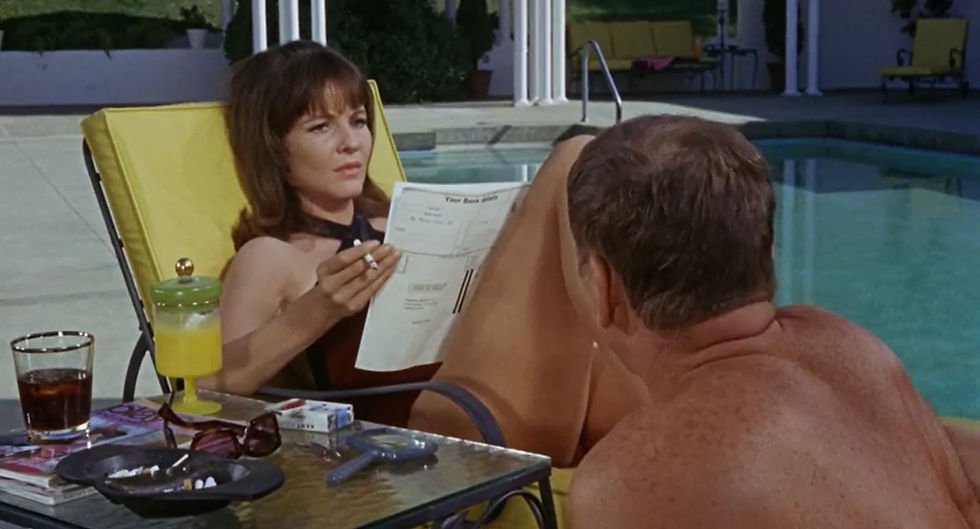
SG: It became obvious that we are supposed to be slightly uncomfortable while watching the movie because Ned is an unreliable narrator. His scene with Janice Rule, an Ohio-born actress who plays his ex-lover, confirmed this. He pushes himself on her, a woman who clearly loved him and couldn't have him the way she wanted him, so she refuses his advances, even though it is clear she still has strong feelings for him. He almost takes it too far.
RB: Rule hailed from Norwood, OH, a peculiar hotbed for talent in Ohio. It’s also the hometown of George Chakaris and Vera-Ellen. Her scenes were originally filmed by Barbara Loden and were reshot in California. Loden was married to Elia Kazan at the time, who some feel was uncomfortable with the harshness of her scenes in the film, and lobbied to have her replaced. As you may know, she later became a pioneering independent filmmaker.
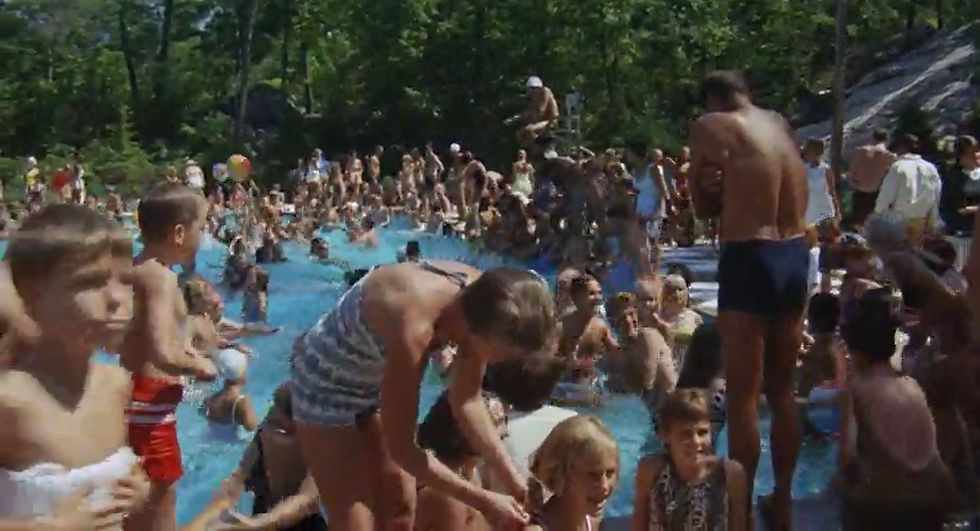
SG: I was moved by the story of a man who seems to have endless optimism, love and boyishness and who is foundering in his own life anyway. In the end, he is deluged by reality. (I can hear Groucho quipping, "He was all wet.") He is living in the past so thoroughly that he refers to his old house as his home and as his grown-up daughters as little girls he can arrange playdates for. I related to his excitement at finding and then devastation that his old hot dog stand had been sold without his knowledge. I tend to get attached to things and have a hard time letting them go because of the memories they contain. This is someone who appeared to have it all and it still crumbled away around him, a relatable and heartbreaking movie. Three stars.
RB: This is a movie that has occupied my mind off and on since I last watched it. There is so much to unpack here, but it’s also a terribly pretentious production. Like you noted, it’s not the kind of film I likely would’ve chosen on my own to watch, although I suspect that there was a time when I may have enjoyed it more than I did at this stage in my viewing of movies. As Variety noted, “a lot of people are not going to understand this film; many will loathe it; others will be moved deeply. Its detractors will be most vocal”. As it stands, I don’t quite know what to make of it. In modern times, it's regarded as a masterpiece of the sort, and while it is thought provoking, I feel as though it doesn’t quite live up to its potential. Three stars.

Comments